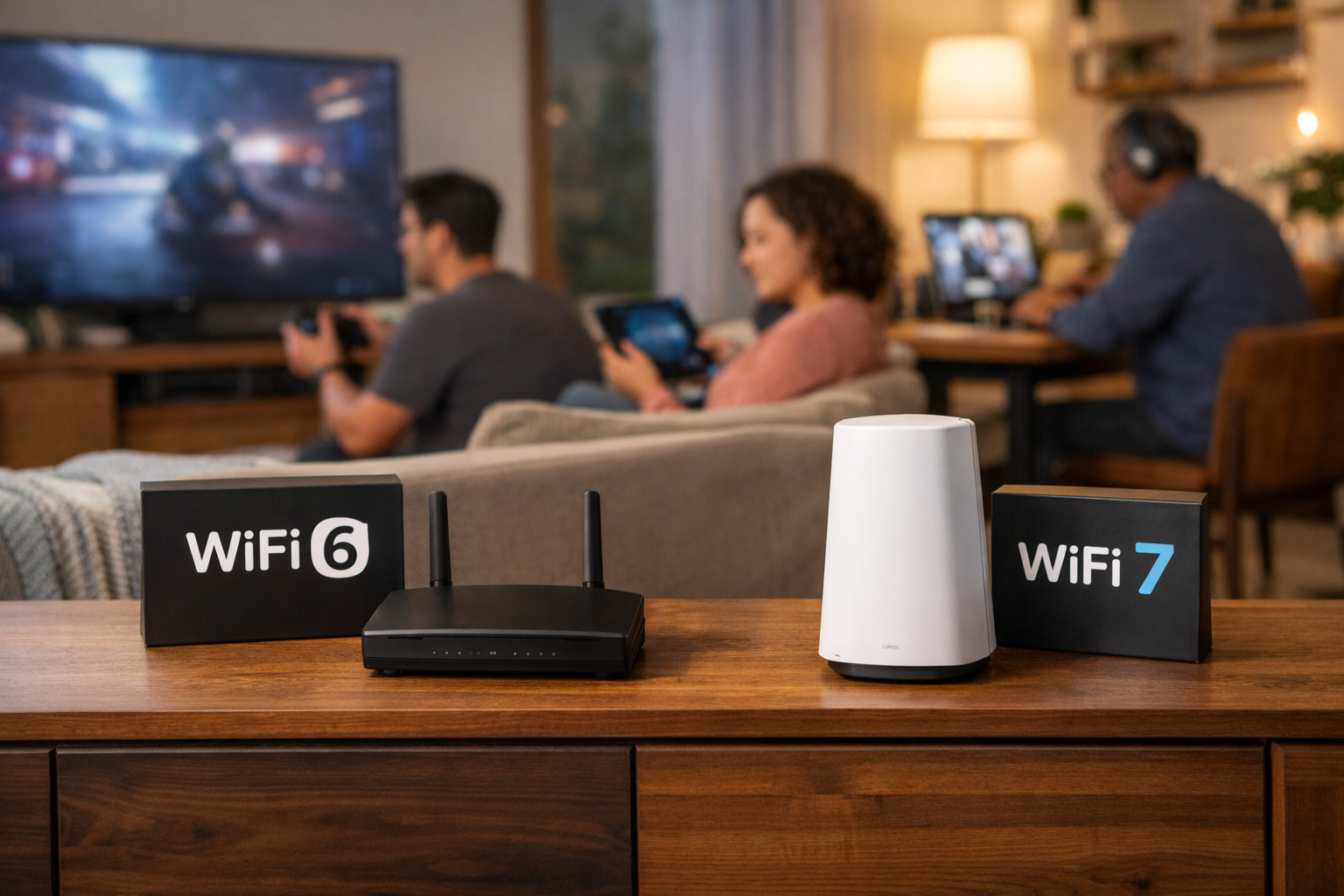How do you know if your internet speed is fast enough for gaming, streaming, and working? Internet speed test results can tell you whether that missed shot in Fortnite was really your fault or due to a slow connection. And if inadequate speeds are booting you out of important client meetings, you need to know how to check your internet speed. So, what is a good speed test result, and what can you do to optimize your experience?
How internet speed is measured
Before diving into the results of an internet speed test, it's helpful to know what happens during a test. When you run an internet speed test, your device connects to a nearby server and exchanges data packets, measuring how quickly data travels and calculating your connection performance in real time.
According to Ookla Speedtest, factors such as your distance from the test server, network congestion, and time of day can affect results. That's why you might see different numbers at different times—your connection isn't necessarily changing, but the conditions are constantly shifting.
How to read an internet speed test
When you run an internet speed test, you're going to get hit with a lot of numbers. Some tests will provide more data than others, but most will reveal three essential numbers:
- Download speed: Measured in Mbps (megabits per second), your download speed tells you how fast your connection can receive data from the internet, like when you stream a video or download a file. Providers often cite download speeds in advertising. In measuring this number, the higher the better.
- Upload speed: Also measured in Mbps, upload speed indicates how fast your devices can send information to other devices or to the internet. It determines how long it takes to post a new video to social media or the strength of your video call connection. You want to see a higher value. If your upload speed is much lower than your download speed, you likely have an asymmetrical internet connection.
- Latency/ping: Your latency number, also called ping, is measured in milliseconds (ms) and tells you how long it takes for a small packet of information to travel from your computer to an external server and back. Latency under 100ms is generally good, but for heavy internet users like gamers, a number under 20ms is better.
What is a good internet speed?
The right internet speed for you will depend on your computing needs—what are you trying to do? Browsing the internet and checking email will require a lot less speed than video conferencing and gaming. Here's a breakdown of how much speed common online activities require:
- Browsing and email:5-25 Mbps
- HD video streaming:25-50 Mbps
- 4K streaming:50-100 Mbps
- Online gaming:50-100 Mbps (plus low latency)
- Video conferencing:25-50 Mbps
- Multiple users simultaneously:100-300 Mbps
- Smart home setup: 200+ Mbps
Learn more about internet speeds and take our internet speed quiz to help determine how much your household needs. Fiber internet from Quantum Fiber symmetrical speeds on most plans and speeds with up to 500 Mbps to 8 Gig in select locations.
What's my internet speed? Check with the Quantum Fiber speed test.
Quantum Fiber customers can test their fiber internet with our free speed test tool. Your internet speed test results should closely match your plan's advertised speeds because fiber-optic technology delivers consistent, reliable performance.
For the most accurate test, connect your computer directly to your router using an Ethernet cable. This eliminates WiFi variables and shows the true speed delivered to your home. You should see speeds very close to your plan's maximum.
One of fiber's biggest advantages? Symmetrical speeds. Quantum Fiber delivers symmetrical speeds on most plans. This can make a huge difference for video calls, cloud backups, and content creation. Learn more about the advantages of fiber internet with Quantum Fiber.
What's a good speed test result compared to your plan?
Your speed test results should reasonably match what you're paying for. No connection delivers 100 percent of the advertised speed consistently. Network connections, equipment, and other factors mean you'll typically see speeds within 50-200 Mbps of your plan's maximum.
For example, if you're paying for download speeds up to 500 Mbps, a speed test result of 450-500 Mbps is excellent. Results between 350 and 450 Mbps can also be acceptable, especially if multiple devices are connected to your network. If you consistently see below 300 Mbps, something might be wrong, and it's a good idea to troubleshoot or contact your internet provider.
Before you run a speed test, review your plan's promises and assess how much bandwidth your household needs. This can help put the numbers in context when you review your internet speed test.
Understanding upload bandwidth test results
While download speeds get the most attention, upload speed has become more important as more people work from home and create content.
Here's what you need for upload-intensive activities:
- Video conferencing (1080p):3-6 Mbps upload
- Live streaming:5-10 Mbps upload
- Cloud backup:10-50+ Mbps upload
- Content creation: 25-100+ Mbps upload
If your upload speeds are significantly lower than your download speeds—500 Mbps down but only 20 Mbps up—you have an asymmetrical connection, which is common with many internet providers. The problem with asymmetric speeds is that your uploads may be slow if you are doing activities, like online gaming or file sharing. Fiber internet solves this with symmetrical speeds on most plans.
What can affect your speed test results?
Your test results can help you identify other issues that could be slowing you down besides your internet speed.
- Testing method: Testing over WiFi will almost always produce slower speeds than wired Ethernet. For the most accurate results, connect an Ethernet cable directly to your router before you run a speed test.
- Equipment: Your router, modem, and devices all have maximum speed limits that can choke performance. If you're using older equipment that hasn't been upgraded to the latest technology, you could experience slowdowns. If that’s the case, upgrading your WiFirouter or adding a wireless mesh network could improve your connection’s performance.
- Connected devices: Every device on your network uses bandwidth—smartphones, tablets, TVs, cameras, and more— which can impact performance.
Optimizing your internet speed
If your internet speed test results are good but your devices aren't performing as fast as you'd like, try the following to optimize your network:
- Position router centrally: Place it in a central, elevated location away from walls
- Use Ethernet for stationary devices: Use wired connections for better performance
- Restart equipment monthly: Resolve issues by rebooting regularly
- Update firmware: Keep routers and other devices up to date with the latest firmware
- Disconnect unused devices: Free up bandwidth to increase speed to other devices
- Consider upgrading equipment: Routers older than 3-4 years may limit speeds
Next steps: Getting your internet to work for you
Now that you understand the meaning of your speed test results, it's time to decide if your current plan fits your needs. Are you getting the speeds you're paying for? Can you game, stream, and work without frustrating interruptions?
If your current speeds aren't cutting it, explore faster options. Fiber internet delivers ultra-fast speeds up to 8 Gig in select locations. Check Quantum Fiber availability in your area.
Frequently asked questions about internet speed tests
How often should I test my internet speed?
It's a good idea to run a speed test monthly to establish a baseline for your internet performance. This helps you quickly find issues if you start experiencing slow internet. When you do have a problem, run multiple tests at different times of day to spot patterns.
Is 100 Mbps considered a fast internet speed?
100 Mbps is the minimum speed for fast internet. It's sufficient for streaming on multiple devices, online games, and video calls. But if you have a large household with lots of devices, stream videos at 4K, or back up to the cloud, you'd be better off with faster speeds of at least up to 500 Mbps.
What's the difference between Mbps and MB/s?
Mbps stands for megabits per second and measures internet speed. MB/s stands for megabytes per second and measures file sizes and download speeds. There are eight bits in a byte, so 100 Mbps equals around 12.5 MB/s.
H3: Do I need the same upload and download speed?
For most people, symmetrical upload and download speeds provide a better experience. While downloads were historically more important, today's activities require higher upload speeds, particularly for video calls, live streaming, and file backups.
Can too many devices slow down my internet?
Yes, each connected device uses a portion of your total bandwidth, which can add up if you have many devices. If you notice slowdowns, try disconnecting devices you're not actively using or consider upgrading to a faster high-speed internet plan.
Will a WiFi extender slow my internet speed?
WiFi extenders can reduce speeds because they rebroadcast the signal that your router receives. Mesh WiFi systems can help performance when expanding coverage in your home. Learn more about the difference between WiFi extenders vs. mesh networks.
Content Disclaimer - All content is for informational purposes only, may require user’s additional research, and is provided “as is” without any warranty, condition of any kind (express or implied), or guarantee of outcome or results. Use of this content is at user’s own risk. All third-party company and product or service names referenced in this article are for identification purposes only and do not imply endorsement or affiliation with Quantum Fiber. If Quantum Fiber products and offerings are referenced in the content, they are accurate as of the date of issue. Quantum Fiber services are not available everywhere. Quantum Fiber service usually means 100% fiber-optic network to your location but, in limited circumstances, Quantum Fiber may need to deploy alternative technologies coupled with a non-fiber connection from a certain point (usually the curb) to your location in order to provide the advertised download speeds. ©2026 Q Fiber, LLC. All Rights Reserved. Quantum, Quantum Fiber and Quantum Fiber Internet are trademarks of Quantum Wireless LLC and used under license to Q Fiber, LLC.








